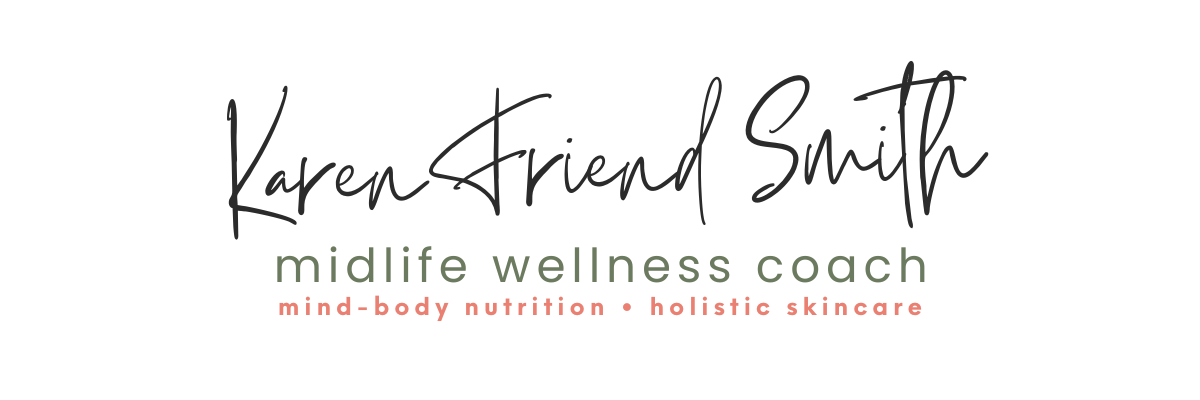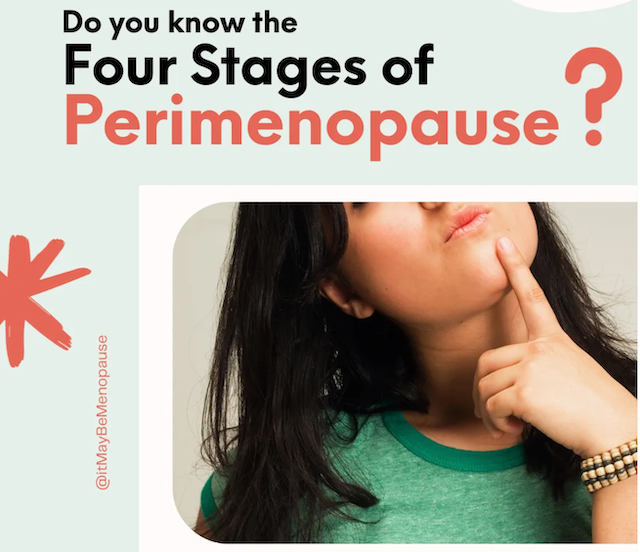WHAT IS PERIMENOPAUSE?
Most of us are at least familiar with the term menopause, but perimenopause? What exactly IS that? How do we know if we are in it? And, why should we care?
Menopause usually happens in your 40s or 50s. The average age here in the U.S. is about 51. It is diagnosed when you reach 12 months after your last period. So, essentially, menopause is just a moment in time. Once you cross that line, you are post-menopause.
Of course, most of us use the word ‘menopause’ to describe all of the phases of this transition, which is one of the problems. It’s hard to talk about something when you don’t really have a shared vocabulary around it.
Perimenopause is the period of time leading up to menopause. It typically starts in your early to mid-40s – sometimes earlier. It can last anywhere from 4-8 years – sometimes longer. And, it is sort of like puberty in reverse.
This is also the phase that catches women by surprise because we are not educated about it + it starts sooner than we think. (And, I should mention, it’s not that women are not educated, no one is, including most doctors, which is crazy. So, it’s easy to see how this happens.)
Hormones fluctuate wildly during perimenopause. About 75% of women experience unexpected, yet very common, physical + emotional symptoms. These might include:
- anxiety
- panic attacks
- depression
- mood changes
- dry skin
- sleep disturbances
- brain fog
- loss of libido
- joint pain
- shoulder pain
A lot of these symptoms happen long before you skip a period – which is why women (and their doctors) don’t necessarily associate these symptoms with menopause.
Looking at the list, you can see how it would be easy to misdiagnose. Many of the symptoms of perimenopause are similar to those of other health conditions like thyroid problems, depression + anxiety.
A lot of these symptoms are also easy to dismiss as signs of stress rather than signs of hormonal changes – especially when you look at what women are doing in their early 40s…busy with work, children, aging parents + a myriad of very real demands.
It’s easy to experience symptoms like these + just think you are exhausted or at the end of your rope.
It’s also easy to think you are losing your mind – especially when your mood swings or your patience wears thin from day to day.
It gets even scarier when you experience brain fog or memory loss + think that maybe there really IS something wrong with you like early-onset Alzheimer’s or something.
I remember having a panic attack in my early 40s. I had never experienced anything like that + had no idea it was associated with perimenopause. Would have been helpful information.
As I mentioned before, women are not the only ones who are surprised by perimenopause. Doctors are too because menopause training is not something most doctors receive. Only about 20% of doctors receive any sort of training around menopause.
Even today, it’s very common for a woman to go to her doctor because something feels ‘off’ or she is experiencing anxiety or depression only to be prescribed an SSRI without really looking at the whole picture or the context of menopause.
It’s also easy to visit your doctor at this stage + be dismissed with no treatment or guidance at all – which happens a lot more than people realize.
HOW DO YOU KNOW?
A question I commonly hear is – how do you know if you are in perimenopause?
To date, there is no test for perimenopause. The first sign is often just very subtle changes in your menstrual cycle or symptoms like the ones I listed above. So, the first step is to track your cycles. Of course, if you’re using some form of contraception that stops your cycle or regulates it, you won’t really be able to do that – which complicates things.
It is also important to track your symptoms. This will help you see patterns – both for yourself + so you can have solid conversations with your doctor.
This is actually an important time to reconnect with your doctor + get current on your wellness exams. For a lot of women, after having children, they may not see their doctor for years at a time. Same can be true for women who don’t have children. When you are generally healthy + crazy busy, it’s easy to have years go by without seeing your doctor at all.
Better to see your doctor + have these conversations BEFORE you need them because it can be really frustrating to learn you don’t have the resources you thought you had when you really need them. And, like I said – this happens a lot.
While some women get through this transition with no major concerns, it can be really challenging for others. That’s why being prepared + watchful over any changes you experience during this time is so important.
You don’t want to discount any symptoms. Use this time to check in on your health + make sure you are not overlooking another health concern.
Perimenopause has a way of shining a light on any vulnerabilities you have – physically, emotionally + mentally. It’s actually one of the amazing benefits of this stage of life. A checkpoint of sorts.
THE FOUR PHASES
It is helpful to realize that there are four phases of perimenopause based on the shifts that occur with our hormones in each phase:
- Very early perimenopause – regular periods, subtle signs of change (2-5 years)
- Early menopause transition – irregular cycles (cycles vary in length by 7 or more days)
- Late menopause transition – skipped period…(60 days with no flow)
- Late Perimenopause – final menstruation (the 12-month waiting period between your last cycle + officially reaching menopause).
The middle phases can last about three years, so you can see this whole transition takes anywhere from 4-8 years. Some stages are more wild than others. And, every woman’s experience is a little different because SO many factors influence it from genetics to lifestyle + environment.
CAN WE TALK?
My little explanation here is a very basic overview of an incredibly transformative period of time in a woman’s life. It’s a complete re-wire + it happens during a time when everyday life demands on us are extremely high.
As a culture, we generally have a level of understanding around hormonal changes + behaviors during puberty, pregnancy + postpartum, but we don’t have any awareness or support for these changes for women during this stage of life. Not at work, not in our social circles, not with our doctors, not even with our families.
During a recent webinar I hosted, a woman in the early stages of perimenopause asked for input on how to help her family understand what she is experiencing + get them on board to support her. This is SO important. A lot of the distress around perimenopause is that we are trying to manage all of it on our own + we don’t really have anyone to talk with about it.
I certainly wish I had talked more with my daughters about it during those early stages while they were still living at home. Of course, I wasn’t even sure if what I was experiencing was perimenopause at that stage, so again – lack of knowledge = lack of confidence = lack of information. A vicious cycle.
During perimenopause, women need extra bandwidth for their own self-care: nutrition, exercise + sleep. They also need education about environmental toxins + how to reduce exposures that can create havoc with hormones. These nutrition + lifestyle factors can be pivotal in helping a woman manage this transition.
We also need a lot more education for clinicians to provide treatment + support for women to address symptoms + navigate this transition. And, we need more research on women’s health – particularly after our childbearing years.
Until then, we need understanding, open conversations + support.
THE EXCITING PART
Yes, perimenopause + menopause are subjects that are still somewhat taboo in our culture. Yes, the process starts + symptoms occur earlier than we think. Yes, it can be a vulnerable time for our health + challenging for our relationships. But, it’s also an exciting time of change.
Just like having a baby – moving through this transition opens the door to a new stage of life. Most of us will live 30-40% of our lifespan on the other side of menopause. Perimenopause is our opportunity to reset our priorities. To address any gaps in our health. And, to reconnect with that part of ourselves we may have forgotten back when the hormones of puberty took over our bodies the first time.
There’s a whole other conversation to be had around WHY this transition occurs + why it is not something to ‘fix’, but to support, revere + nurture. Maybe we can get into that in a future post.
P.S. If you enjoyed this post, you’ll love my weekly newsletter on Substack. It’s called The LIFT + it comes out on Sundays. You can check it out & subscribe here.


